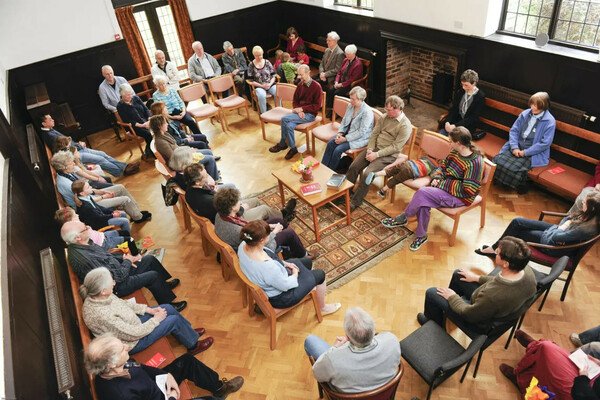The Deeper Spirituality of Quaker Decision-Making.
Quaker Decision-Making as a Form of Worship.
At its core, Quaker decision-making is not just a method for resolving practical issues but a profound spiritual practice rooted in worship. For Quakers, every decision-making process is a way to connect more deeply with the divine, listening for the Inner Light that guides each person’s soul. This connection is central to the spiritual depth that Quakers bring to the practice of discernment.
Silence as Sacred Space
One of the most remarkable aspects of Quaker decision-making is the use of silence. For Quakers, silence is not merely the absence of sound; it is a sacred space where the Spirit speaks to each person. In these moments of deep stillness, participants are encouraged to let go of personal agendas and ego-driven desires and listen for the quiet promptings of divine guidance. This silence allows time for reflection, helping individuals to sift through their thoughts and discern what is spiritually true.
The act of waiting in silence is also a form of surrender, trusting that the right answer will emerge not from human reasoning alone but from the collective spiritual wisdom of the group. This makes Quaker decision-making a deeply prayerful process, where every contribution is seen as a possible expression of the divine.
The Collective Search for Truth
Quakers believe in the idea that truth is not fixed or held by a single individual but is something that emerges from the collective spiritual search. This means that decision-making is not about convincing others of one’s own view, but about discerning what feels right in the eyes of the Spirit. This collective search for truth is grounded in the belief that the Inner Light—the divine within each person—can guide the group toward unity.
During Meetings for Worship for Business, participants speak only when they feel genuinely led to do so by the Spirit. Each contribution is treated as a ministry, with deep respect and reverence. The process of vocal ministry, followed by periods of silence, allows time for the group to reflect on each contribution, listening not just to the words but to the deeper spiritual message behind them.
Unity as Spiritual Harmony
The aim of Quaker decision-making is not to reach consensus in a typical sense, but to find unity—a shared sense of spiritual rightness. Unity is seen as a form of spiritual harmony, where the group feels that they have arrived at a decision that is aligned with divine will. This is different from compromise or unanimity, as it requires participants to transcend their own personal desires and align with what feels morally and spiritually true.
When unity is reached, it is not just a practical agreement; it is a moment of deep spiritual significance. The decision is seen as an expression of divine guidance, and the group can move forward with confidence, knowing that they have acted in alignment with their spiritual values.
The Role of the Inner Light
Underlying the entire process is the Quaker belief in the Inner Light—the direct experience of the divine that resides within each person. This concept is what gives Quaker decision-making its unique spiritual depth. The Inner Light serves as a guide for each individual and for the community as a whole, helping them to discern what is spiritually right in any given situation.
This emphasis on the Inner Light distinguishes Quaker decision-making from more secular or hierarchical models. It empowers every individual, reminding them that they have direct access to divine wisdom and can contribute to the collective search for truth.
The Spiritual Practice of Letting Go
A key part of the spirituality of Quaker decision-making is the practice of letting go. Participants are encouraged to let go of personal preferences, attachments, and ego-driven desires in order to listen more deeply to the Spirit. This requires humility, patience, and a willingness to trust that the right answer will emerge in time. Letting go is not easy, especially in situations where there may be strong opinions or emotional investment, but it is essential to the process of spiritual discernment.
This practice of letting go is mirrored in the way that Quakers approach decision-making in their daily lives. Whether in personal matters or in larger social issues, Quakers seek to align their actions with the guidance of the Spirit, letting go of the need for control or certainty and trusting in the unfolding of divine will.
A Spiritual Model for the World
Quaker decision-making offers a model that goes beyond the Quaker community. Its focus on silence, deep listening, and collective discernment provides a powerful alternative to more adversarial forms of decision-making found in the wider world. By seeking unity rather than victory, and by placing spiritual truth at the heart of the process, Quakers offer a way of making decisions that is grounded in peace, integrity, and respect for all.
In a world that often prioritizes speed, efficiency, and competition, the Quaker approach reminds us of the importance of patience, reflection, and the pursuit of deeper truths. It invites us to slow down, listen more carefully, and make decisions that are not just practical but spiritually aligned.
Further reading:
A collaborative method of decision-making



